Gemma Driver on foie gras: a French way of life?
 The debate on foie gras can be a complicated one – no matter how delicious it is, knowing full well how it is produced we can’t help but feel guilty every time we eat (and enjoy) it.
The debate on foie gras can be a complicated one – no matter how delicious it is, knowing full well how it is produced we can’t help but feel guilty every time we eat (and enjoy) it.
For Gemma Driver – French gastronomic aficionado – the question is a lot clearer.
Hear her opinion on this controversial cuisine, what first got her interested in French gastronomic finesse, and most importantly – how she combats her longing for France!
Gemma, how would you describe yourself in three words?
Empathetic, greedy, multifarious.
Where did your interest in French cuisine and gastronomy come from?
Travelling around and living in France. The buzzing markets, epic village meals, holiday menus du jour, the local love of foraging, French pride in quality produce, and the care taken with old family recipes all kept me inspired for many years, and continue to do so.
I’m still learning about local food traditions in my tiny area of France, and across the country is a vast variety in styles of food production and cuisine, so there’s a new gastronomic secret to explore on every trip, even just an hour down the road.
Why did you decide to move to the Dordogne? What drew you to the region?
After a couple of tours of France by motorbike, my partner at the time and I were drawn to the ancient stone buildings and medieval atmospheres of Périgueux and the surrounding area.
We bought when property prices were increasing rapidly, after being unable to afford to rent in the UK anymore. On the last day of a trip all over France to find a home we were facing failure, and knew that if we left it any longer we would not be able to afford a property in France anymore. We had ended up in Périgueux and in a fit of panic had arranged one last house viewing before dashing across France to get our ferry back.
The viewing turned out to be the 13th Century stone house and barns that would end up being our home for the next few years. When we split up and had to sell our amazing house, we both chose to stay on in the area, and I still relish the medieval ambience, strong traditions and vibrant seasons that I first sensed on holiday all those years ago.
How do you remain connected to all things French when in London?
I still have my little cottage in France, and speak to friends in the area all the time. Hearing the local gossip and about what the seasons are bringing keeps me connected. And can make me very homesick!
What do you miss the most about France?
The climate. Summer is hotter and longer, autumn is crisper, winter is colder but with more blue skies and less rain, spring is intense with colour and wildlife. And these seasons are all tied up with the way of life, like log fires and mushroom hunting, or swimming in waterfalls and eating outside.
Let’s talk foie gras…
What is it that fascinates you about foie gras? What encouraged you to bury yourself in the ethics and production of foie gras?
I had tasted foie gras and loved it, but was aware that there were ethical issues surrounding its production. I felt guilty eating it, but this didn’t tally with seeing the foie gras ducks living free-range in fields nearby, or the locals’ view of foie gras as wholesome.
So, I decided to visit small farms and big producers to find out about the production methods and get a better understanding of why foie gras is contentious and whether I should stop supporting the industry by not eating foie gras. I found that preconceptions of foie gras production can be inaccurate or in fact completely wrong.
Why do the French love foie gras? Why is it considered such a luxury item?
It is an extremely rich and luxurious food in terms of texture and flavour, and it is expensive to produce. The French love foie gras because it is absolutely delicious, and they view its production in a completely different way to foreigners, so their enjoyment of foie gras isn’t tainted by guilt.
Non-French people tend to think it might be cruel to produce foie gras due to force-feeding, whereas the French see it as normal to fatten an animal before slaughter.
In reality, it is somewhere in between; force-feeding is not always cruel and the birds are free-range until the last two weeks of their life, but the cages used during the last two weeks of industrial-scale production are probably very unkind.
The French also place a lot of value on tradition, and foie gras is a very traditional luxury.
Tell us one thing we we’d be surprised to know about foie gras.
None of the bird goes to waste. The legs go into confit and cassoulet, the neck is stuffed like a sausage, breasts are the famous magret steaks, there’s a prized strip of fillet, other meat goes into rillettes (potted meat), and the carcass is sold to make soups. You can even buy the tongues and blood cakes at the market.
What is your favourite foie gras recipe?
It has to be seared fresh foie gras, but sometimes only buttery preserved foie gras entier hits the spot.
Gemma’s favourite places in Dordogne & Périgord
To eat
Moulin du Roc – fine dining in the northern Dordogne, and Au Bien Bon’s top notch traditional bistro food in rue des Places, Périgueux.
Moulin du Roc24530 Champagnac de bélair, Dordogne Au Bien Bon
15 rue des Places, 24000 Périgueux
To drink
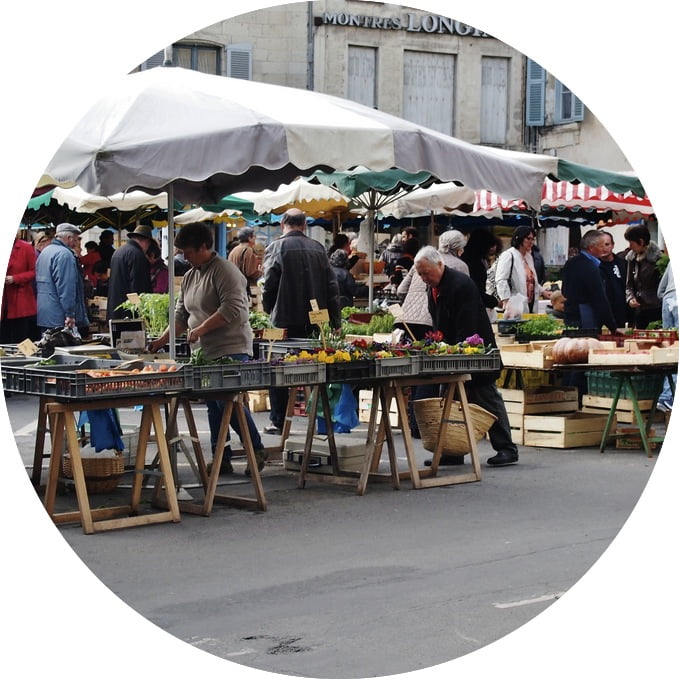 The Star Inn, in Périgueux, but this is really for ex-pats to get the latest goss and share local knowledge – and eat fish ’n chips with a pint!
The Star Inn, in Périgueux, but this is really for ex-pats to get the latest goss and share local knowledge – and eat fish ’n chips with a pint!
Also, the summertime-only La guinguette (beach shack) in Thenon – simple food and drinks by a pretty little lake.
The Star Inn17 rue des Drapeaux, 24000 Périgueux La Guinguette de l’étang
24210 Thenon
To grocery shop
Périgueux market – endlessly inspiring.
For a day trip
The beaches south of Bordeaux – white sand, hot sun, oyster cafés, big waves. It’s like another world but is only a couple of hours from Périgueux.
Merci beaucoup, Gemma, for sharing your life and work with us – we have been inspired to try more French delicacies!
Do you like foie gras? What do you think of the production of this French delicacy? Share your thoughts in the comments below.
Image credits:1. Gemma Driver, via gastropod.co.uk.
2. Medieval Dordogne, by Bodilly Mill via Flickr.
3. Foie gras birds, via dw.de.
4. Foie gras terrine, by Els via Flickr.
5. Périgueux market, by RosiesAreRed via Flickr.

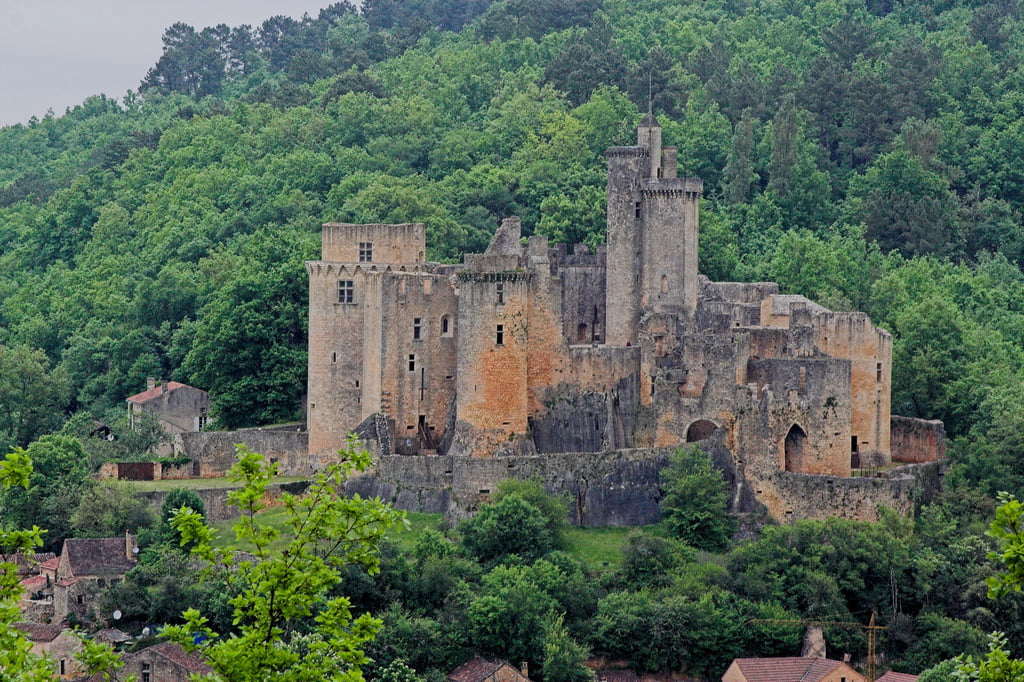

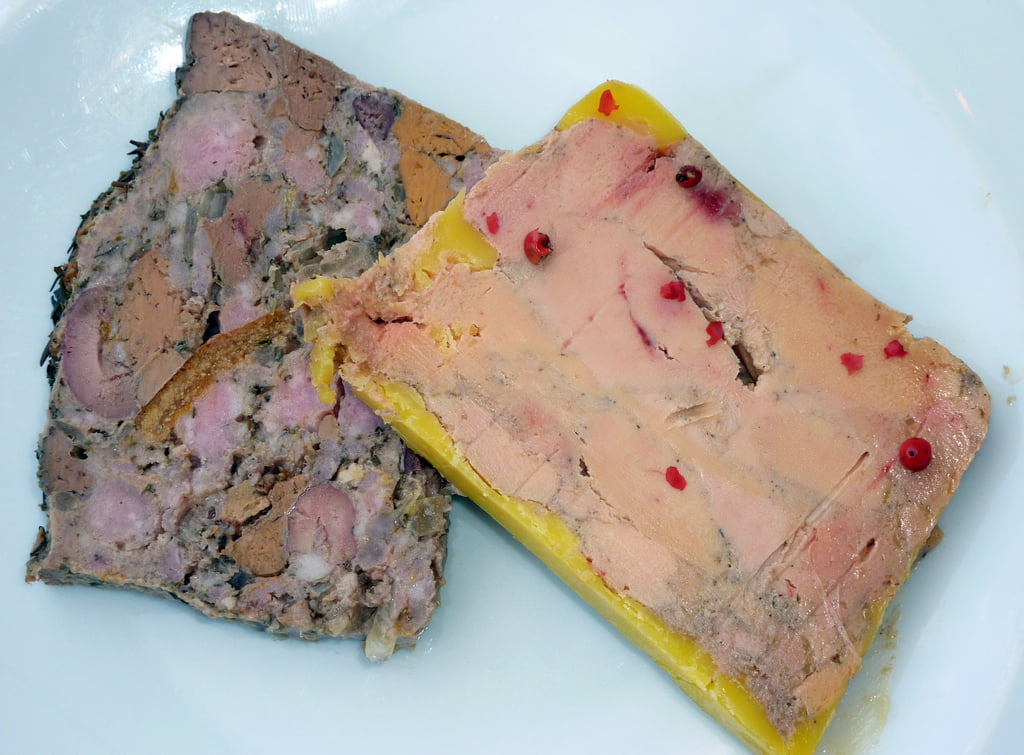
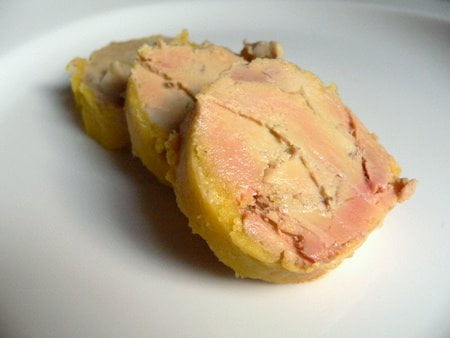
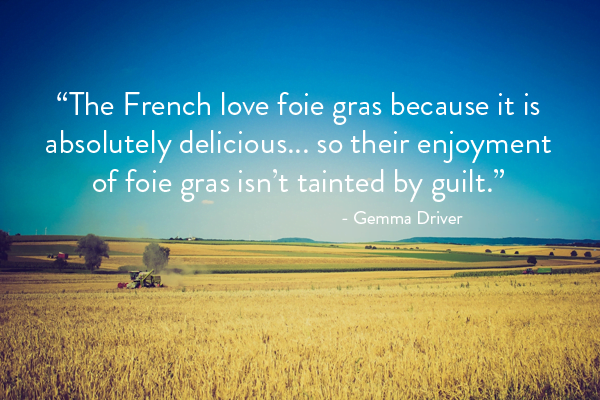






I eat foie gras and find it quite delicious. It is truly a taste that can’t be beaten. I grew up in a farming community and have seen animals slaughtered for food. I have read about the production of foie gras and seen videos. I have always had pets of my own and I also don’t agree with cruelty to animals. However what I consider cruel is both less and more than what other people do. I think it’s cruel to leave a dog alone in a yard all day while its owner goes to work but I don’t think force feeding a goose for food production is cruel.